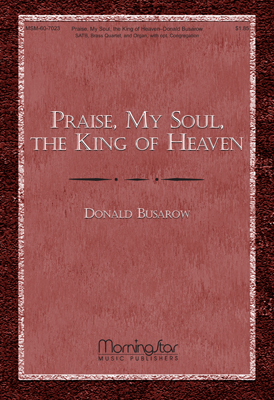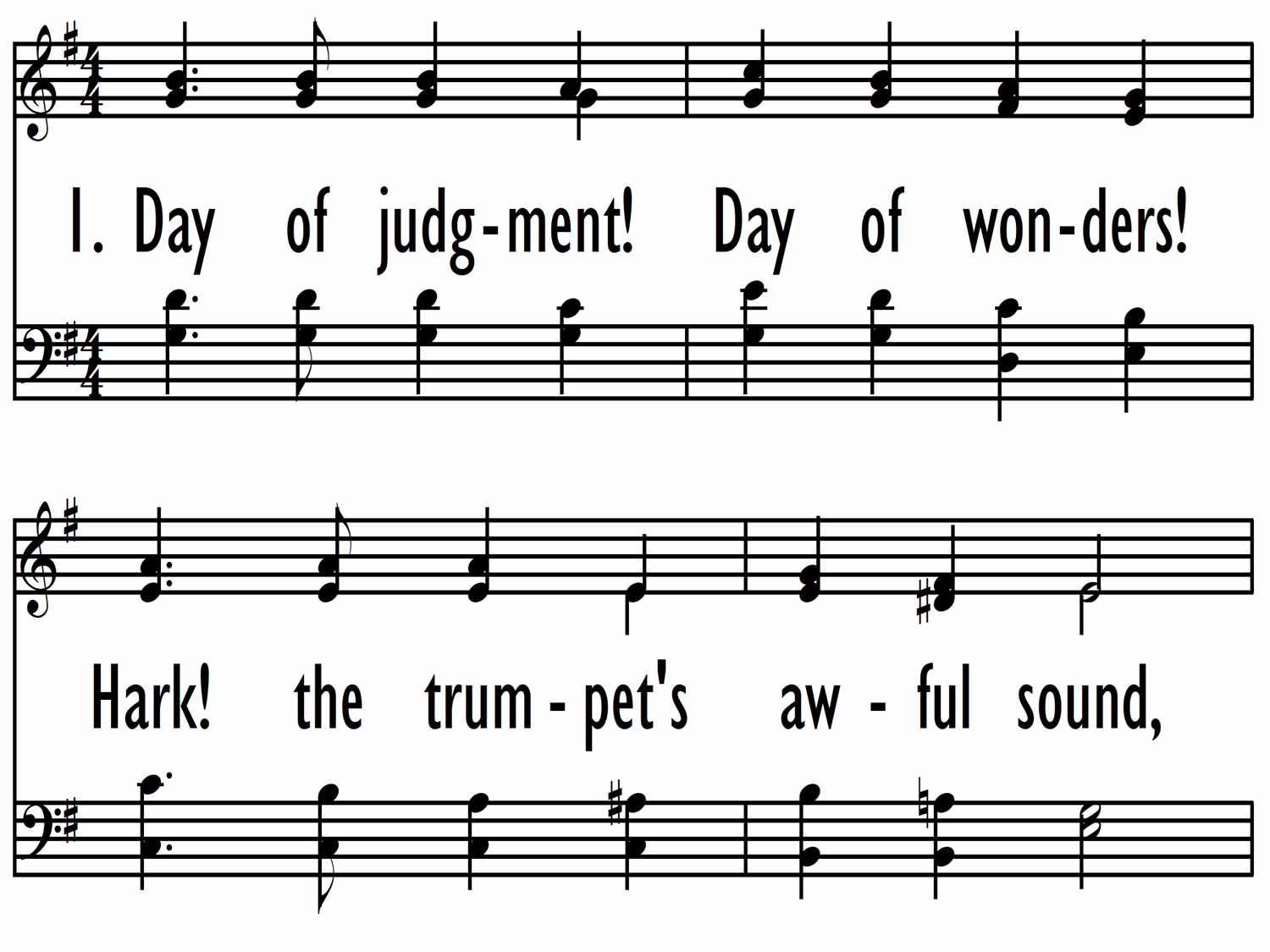- |
User Links
Day of Judgment! Day of Wonders!

Day of judgment! day of wonders!
Author: John Newton (1774)Published in 340 hymnals
Printable scores: PDF, MusicXMLAudio files: MIDI
Representative Text
1 Day of judgment! Day of wonders!
Hark! the trumpet's awful sound,
louder than a thousand thunders,
shakes the vast creation round.
How the summons
will the sinner's heart confound!
2 See the Judge, our nature wearing,
clothed in majesty divine;
you who long for his appearing
then shall say, "This God is mine!"
Gracious Savior,
own me in that day as thine.
3 At his call the dead awaken,
rise to life from earth and sea;
all the pow'rs of nature, shaken
by his looks, prepare to flee.
Careless sinner,
what will then become of thee?
4 But to those who have confessed,
loved and served the Lord below,
he will say, "Come near, ye blessed,
see the kingdom I bestow;
you forever
shall my love and glory know."
Source: Trinity Psalter Hymnal #387
Author: John Newton
 John Newton (b. London, England, 1725; d. London, 1807) was born into a Christian home, but his godly mother died when he was seven, and he joined his father at sea when he was eleven. His licentious and tumultuous sailing life included a flogging for attempted desertion from the Royal Navy and captivity by a slave trader in West Africa. After his escape he himself became the captain of a slave ship. Several factors contributed to Newton's conversion: a near-drowning in 1748, the piety of his friend Mary Catlett, (whom he married in 1750), and his reading of Thomas à Kempis' Imitation of Christ. In 1754 he gave up the slave trade and, in association with William Wilberforce, eventually became an ardent abolitionist. After becoming a tide… Go to person page >
John Newton (b. London, England, 1725; d. London, 1807) was born into a Christian home, but his godly mother died when he was seven, and he joined his father at sea when he was eleven. His licentious and tumultuous sailing life included a flogging for attempted desertion from the Royal Navy and captivity by a slave trader in West Africa. After his escape he himself became the captain of a slave ship. Several factors contributed to Newton's conversion: a near-drowning in 1748, the piety of his friend Mary Catlett, (whom he married in 1750), and his reading of Thomas à Kempis' Imitation of Christ. In 1754 he gave up the slave trade and, in association with William Wilberforce, eventually became an ardent abolitionist. After becoming a tide… Go to person page >Text Information
| First Line: | Day of judgment! day of wonders! |
| Title: | Day of Judgment! Day of Wonders! |
| Author: | John Newton (1774) |
| Meter: | 8.7.8.7.4.7 |
| Source: | Dies Irae, Latin, 13th cent., based on |
| Language: | English |
| Copyright: | Public Domain |
Notes
Scripture References:
st. 3 = Matt. 25:41-46, Rev. 20: 11-14
st. 4 = Matt. 25:34-40
John Newton (PHH 462) wrote this text during "the most of two days" in 1774, and it was published in the Olney Hymns (1779). The Psalter Hymnal includes the original stanzas 1-3 and 6. Newton's text borrows phrases and concepts from the thirteenth-century Latin sequence "Dies irae, dies illa," which has sometimes been attributed to Thomas of Celano (without specific evidence), a friend of Francis of Assisi. The "Dies irae" became part of the Roman Catholic Requiem Mass and was often included in dramatic musical settings that emphasized the judgment of sinners. Many of the various popular English translations of that ancient Latin text begin with the words, "Day of wrath, O day of mourning."
Although the "Dies irae" holds out judgment for the unrepentant sinner, it also contains prayers for mercy for the believer. Newton clearly announces the judgment of God on sin and sinners in his hymn text (st. 1, 3), but he also transforms the original prayers for mercy into comforting words of assurance for believers in Christ (st. 2, 4). The text concludes with a paraphrase of Jesus' words in Matthew 25:34, "Come, you who are blessed by my Father; take your inheritance, the kingdom prepared for you since the creation of the world."
Liturgical Use:
Advent; other worship that focuses on Christ's return in glory "to judge the living and the dead."
--Psalter Hymnal Handbook.
================
Day of Judgment, day of wonders. J. Newton. [Advent.] Written in 1774, and first published in the Olney Hymns, 1779, Bk. ii., No. 77, in 7 stanzas of 5 lines, and headed "The Day of Judgment." In the Rev. J. Bull's work on Newton, this hymn is referred to under the date of 1775 as follows:—
”’Sunday, 26th, spoke in the evening from a hymn on the day of judgment.' This hymn, he says previously, took him the most of two days to finish."
The quotation “Sunday, 26th," &c. [June 26th, 1775] is from Newton's Diary. Few of our author's hymns have attained to greater popularity than this both in Great Britain and America. It has been translated into several languages, including Latin (stanzas i.-iii., vi.): "Dies mirandorum! dies," in Bingham's Hymnologia Christiana Latina, 1871. Original text in Lyra Britannica, 1807, p. 440.
--John Julian, Dictionary of Hymnology (1907)
Access an additional article on the Canterbury Dictionary of Hymnology:


 My Starred Hymns
My Starred Hymns





